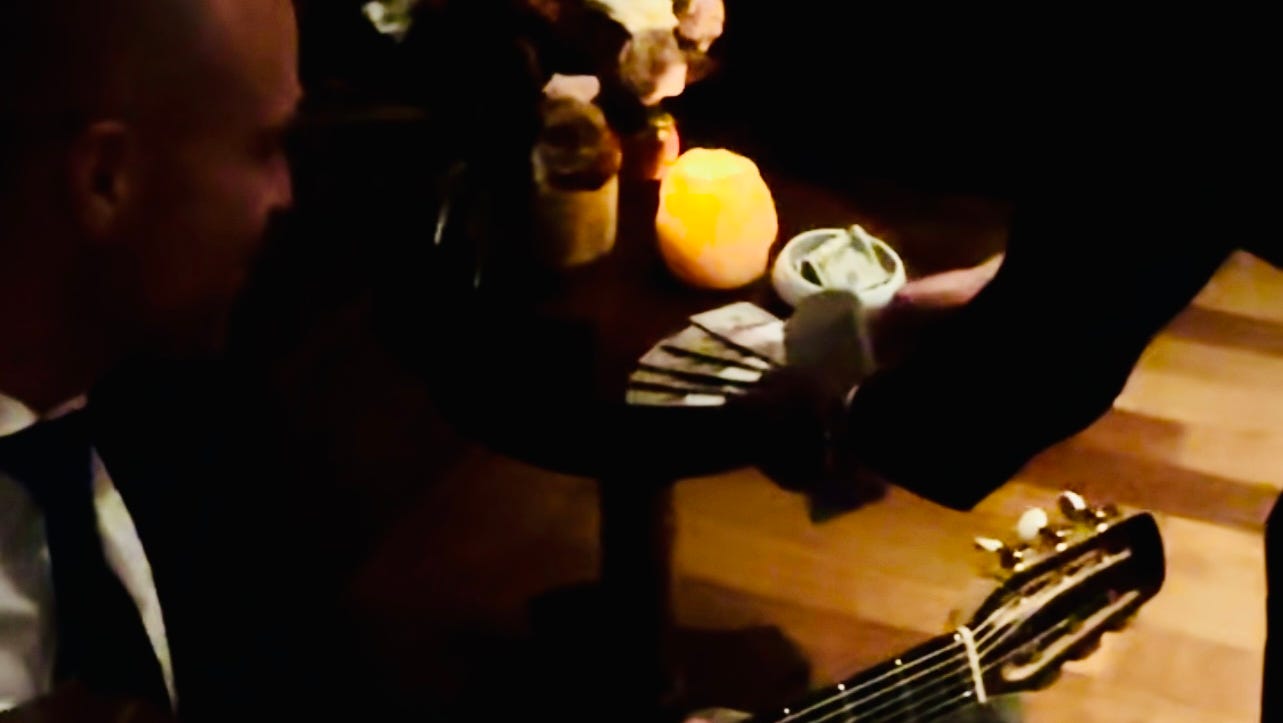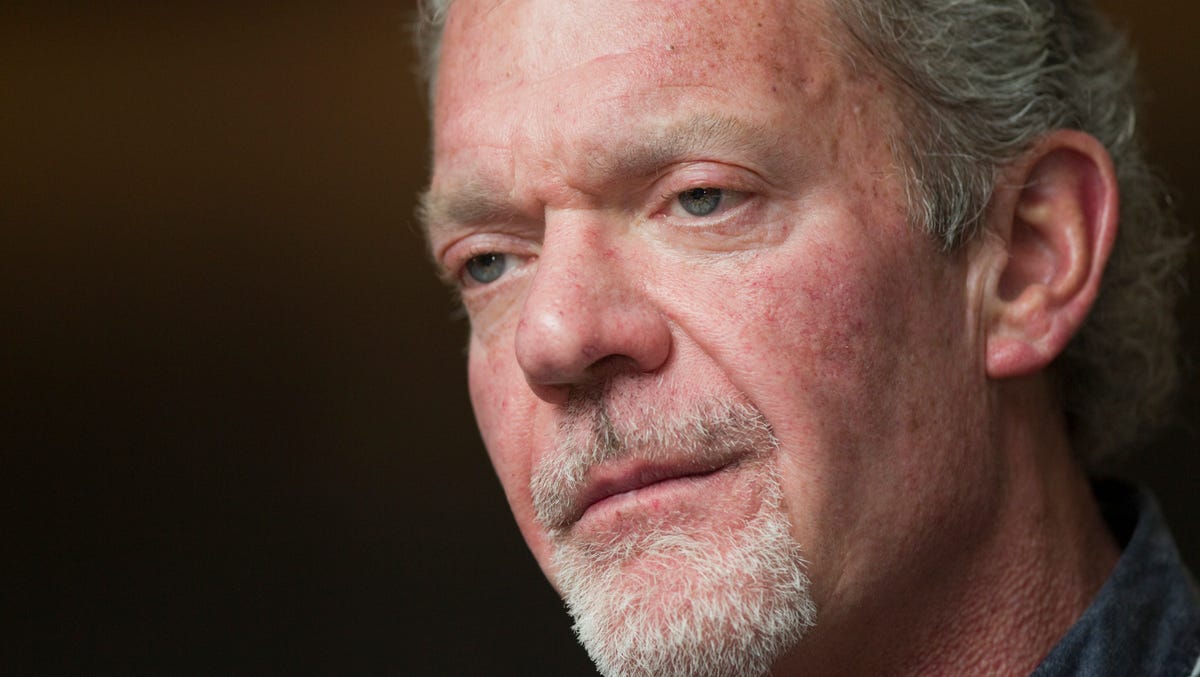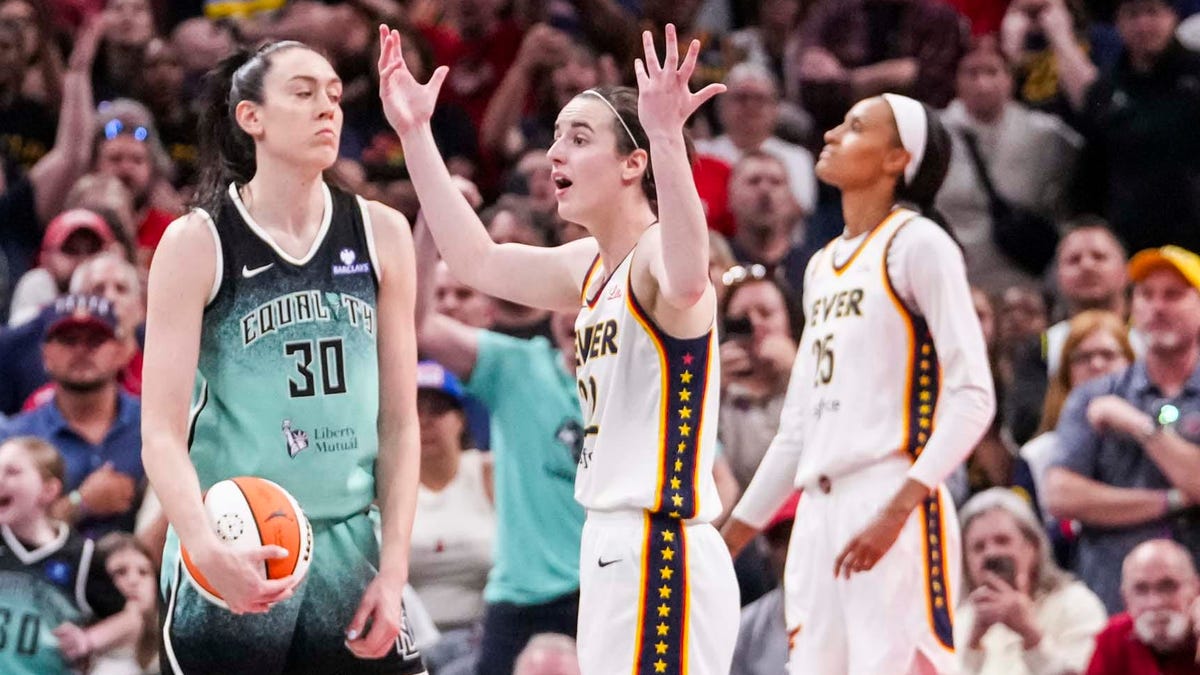INDIANAPOLIS − Colts owner Jim Irsay was gentle, generous and imperfect. He made public, painful mistakes. He did private, precious things.
Jim Irsay died Wednesday afternoon at age 65, having “passed away peacefully in his sleep,” according to Pete Ward, the Colts’ chief operating officer and Irsay’s righthand man for decades in Indianapolis.
The heart breaks, because Jim Irsay is gone and everything is less than it was just one day ago. The Colts are less without an owner who loved his players like brothers or, in recent years, like the sons he never had. The city is less without a philanthropist who had occasional battles with inner demons, yes, but listened regularly to his better angels and contributed to causes big and small all over the city. Such is the legacy of Irsay’s generosity that it would be irresponsible to list the groups he supported – though we’d start with IPS schools and his $1 million challenge during the COVID school shutdown of 2020 – because Irsay was writing checks all over town, and nobody knew.
Words would come in from struggling parents and animal rescue groups and restaurant owners and … so many.
“Don’t write about this, but somehow Mr. Irsay heard about…”
Like that. For years. Those are the emails or private comments that would come in, starting along those lines: With Mr. Irsay hearing about something tragic, something dire, and writing a check.
Around the country, they didn’t know Jim Irsay. They knew the cartoon, the caricature, the man who made newsworthy soundbites every time he talked with the media and waged a very public war with addiction.
You wonder if people were paying attention to the rest of the man, the whole man, the one with the courage to talk about it – to turn the Colts into a crusade for mental health awareness. Kicking the Stigma, the Irsay family decided to call their initiative in 2020. That was the Jim Irsay we knew around here.
And some of us, if we were lucky, knew him just a little bit better.
Jim Irsay: Fascinated with death
Jim Irsay talked about death quite a bit. His death – the one he’d avoided more than once, the one he knew was coming eventually – and the deaths of others. He was fascinated, maybe even obsessed, by the blessed but tragic lives of Elvis Presley and Kurt Cobain, John Belushi and Hunter S. Thompson.
Irsay saw himself in them, in all their blessings, and all their addictions.
“Chuck Pagano had leukemia – he got better,” Irsay told me once, building to something bigger, as he tended to do. “My dad was an alcoholic – he didn’t get better. That’s what fatal diseases do. You have a choice, but in the end, Kurt Cobain wanted to get sober, John Belushi wanted to get sober, Chris Farley wanted to get sober, Elvis Presley. They couldn’t. Why? Because it was a fatal disease. They couldn’t just say, ‘Well, I’m going to get better from this.’ That’s not how it works.”
This was Jim Irsay at his most honest, and it didn’t take much to get him there. Just ask the man about his addiction, his mental health, his childhood. He’d tell you about his dad, Baltimore Colts owner Robert Irsay, coming home “liquored up” and frightening the family Poodle and getting bitten by the little 9-pound dog. He’d tell you that Robert got his two pistols and started shooting. Missed the dog. Hit the walls. Went to the hospital for stitches. Later his mother would emerge from the closet where she kept her furs, where she’d hide when Robert got drunk.
Jim would talk about that, because his dad’s story was his story: Rich men, and addicts. Owners of an NFL franchise, maligned and misunderstood.
“The media thinks they know my dad,” Jim said once. “They didn’t know my dad. They had no clue who he was.
“My dad was such a great man, an incredible man, a special man. That’s the thing with mental illnesses. They can really change people.”
Addiction changed Irsay, but not permanently. He’d have moments, ugly moments that made headlines or got him suspended by the NFL. He was hospitalized at length last year after what was believed to have been at least his second overdose, when Irsay was found unresponsive at his home in December 2023, cold to the touch and turning blue. The Carmel Police Department incident report labeled it as a suspected overdose.

Indianapolis Colts owner Jim Irsay awes hotel workers with big tips
A hotel housekeeper and a guitarist were just two workers surprised by Irsay Saturday night.
This came three weeks after he’d told Andrea Kremer of HBO Real Sports that he’d been to rehab 15 times – “at least,” he’d said – and told Kremer about an earlier overdose that had a doctor telling him:
“Jim, you’re one lucky man – because I had signed, virtually, the death certificate.”
Jim Irsay talked about death a lot. Publicly on HBO. Privately to me. No telling how many others heard it.
“When I weighed 300 pounds,” he told me of a time in his life decades ago, “I just wasn’t going to wake up the next day. Die in my bed. Tom Petty, Prince – it happens all the time.”
Jim Irsay: ‘It’s dust to dust’
“They say you live many lives,” Irsay told me once. “I tell you: This is my last one, I can feel it. I’ve done everything, with the grace of God, that was asked of me. And all that was asked of me was to do God’s will and not my will. To try to follow that image of love as best as I could.”
This was Jim Irsay, the philosopher poet, the man you’d see in glimpses whenever he’d get behind a microphone and start crooooooning out those words in that deep, gravelly voice, welcoming another franchise legend into the Colts’ Ring of Honor or talking about Andrew Luck’s latest injury or the firing of Frank Reich and hiring of ESPN’s Jeff Saturday as interim coach.
Irsay would drop the names of dead men into his commentary. George Harrison (“His beliefs, my sweet lord”), and Elvis Presley (“so sad what happened to him) before veering off in another direction, going from John Belushi (“He wanted to get sober”) to more talk about God.
“I’m not an extremely religious person,” he told me once. “God just is, and always has been. It doesn’t really matter what Gregg thinks or Jim thinks or Iraq thinks or the Vatican thinks. God just is.
“You can think all you want about it, but to me it’s irrelevant. There are certain principles, spiritual truths that are undeniable: Treat others like you want to be treated. I haven’t my whole life, there’s no way. But you try your best to recognize those spiritual truths and embrace them and go forward.”
Irsay tried his best. He did it in ways we generally didn’t hear about, but there were times he wanted to inspire others. Those were the times he’d talk about it, or more: He’d challenge the rest of us to care about our neighbors as much as he did.
That was the genesis of his million-dollar challenge in 2020, when he called me, out of the blue, to see if I’d share the following challenge with IndyStar readers: Raise $200,000 to help feed IPS students missing out on COVID-canceled school and the free meals there, perhaps their only meals of the day. If the city would raise $200,000, he’d write a check for $1 million.
Understand, Irsay could’ve written a check for $1.2 million. But that’s not what he wanted. He wanted the rest of the city to care. And the rest of the city did. At the end of the day, after the city had raised $293,000, Irsay wrote a check for $1 million.
Irsay would talk about that, if you’d ask, but he preferred to talk about that place where addiction meets death – or, in his case, should have. He’d talk about driving in August 2021 with Edgerrin James toward Edge’s Pro Football Hall of Fame induction in Canton, Ohio, driving past a graveyard and seeing all those tombstones with all those names, marveling that his name wasn’t among them.
“I might as well have gotten out of a grave in that graveyard, got out of my coffin, walked to the street and hopped in the car – because I was a dead man walking,” Irsay told me once. “That might as well be what happened, being lowered 3 feet into the ground.
“That’s what addiction can do.”
Then he’d use World War II as a verbal prop. His brain was a different, wondrous thing.
“When you’re in recovery you’re in war time, you’re at Omaha Beach,” he said once. “People are crushing you and saying you’re a bad person – ‘what’s wrong with you?’ Imagine how difficult that would be. You are not in a position of admiration. It’s so inglorious. Yet you’re asked to do the most courageous thing in the world without any glory, in fact just the opposite.”
He’s talking about the 12 steps of recovery, a process so special to him, he bought the Alcoholics Anonymous Big Book at auction in 2018 for more than $2 million.
“I’ve never seen anybody in a hearse pulling a U-Haul,” he said once. “I’ve never seen anybody going to a cemetery pulling a U-Haul. It’s dust to dust. We’re all equals. Every single one of us matters.
“The greatest discovery of the 20th century: Polio vaccine? Moon shot? No, the big book, the 12 steps to recovery.”
This is why he had the Colts introduce the Kicking the Stigma campaign in 2020.
“I’ve seen too many young men and women go into the ground,” he’d told me. “I’ve watched them, the parents, brothers and sisters, grandparents – watched the bodies lowered into the ground. It makes you, compels you, if you have a chance and if you’re blessed enough, to change the world, change your community.
“By God I’m going to try. I’ll keep trying until the last breath in me.”
Wednesday was the day, the one he knew was coming – one he’d expected would come so much sooner. That it took longer than he expected? We are better for it, here in Central Indiana.
Godspeed, Jim Irsay.
Find IndyStar columnist Gregg Doyel on Threads, or on BlueSky and Twitter at @GreggDoyelStar, or at www.facebook.com/greggdoyelstar. Subscribe to the free weekly Doyel on Demand newsletter.










